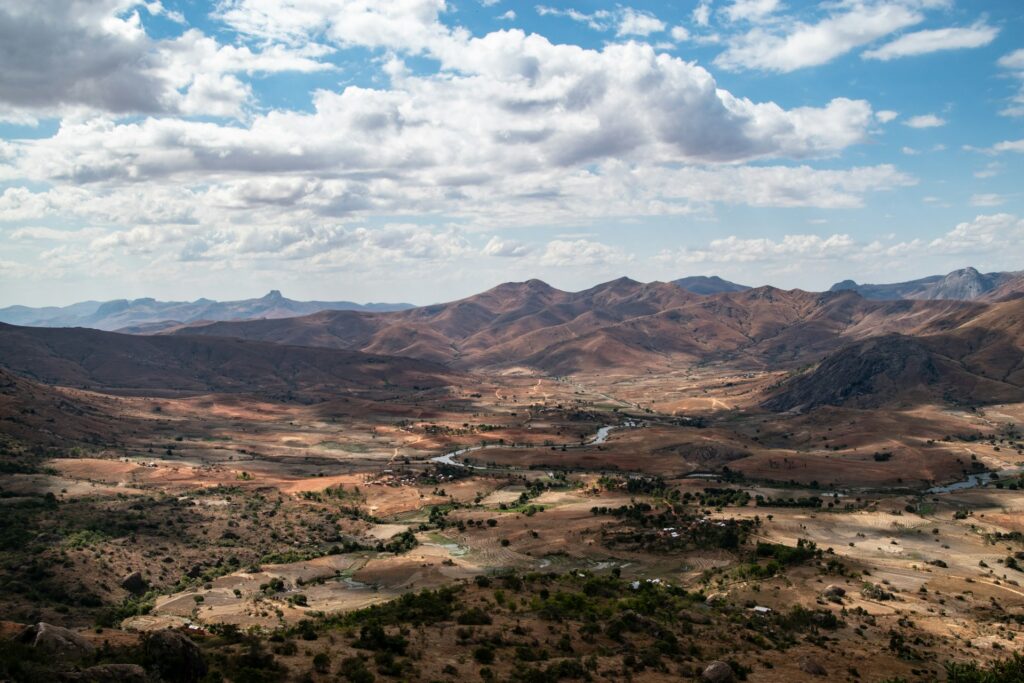The United Nations has suggested that Madagascar may be the first country to face climate-induced famine. A large share of the population relies on rainfed agriculture, and are highly vulnerable to climate change effects such as drought. In this blog post, SIANI’s Jonna Wiklund and Brian Fisher from the Madagascar Biodiversity Center, discuss how introducing black soldier flies (BSF) in farming can help smallholders cope with climate-related shocks, in Madagascar and elsewhere.
Madagascar, located off the southeast coast of Africa, is facing alarming levels of hunger and is ranked 124th out of 127 countries in the 2024 Global Hunger Index. The causes are complex and include climate change related shocks, widespread poverty, and low agricultural productivity. In late 2024, 1,64 million people in the country were estimated to be severely food insecure. The situation has been especially acute in the country’s southern region – the “Grand Sud” – where severe droughts have devastated agricultural production and livelihoods, creating what has been described as the world’s first “climate-change induced famine.”
Multiple challenges demand systemic solutions
Madagascar is known for its rich biodiversity, but to cope with declining yields and poverty, many farmers turn to clearing forests for short-term cultivation. Yet once soils are depleted the land is often abandoned and new areas are cleared, creating a cycle of deforestation and land degradation. The practice of slash-and-burn agriculture (locally known as “tavy”) also contributes to deforestation.
The Madagascar Biodiversity Center (MBC) is working together with local farmers, who have witnessed firsthand the damaging effects of deforestation and land degradation on their livelihoods, to develop more sustainable solutions. Many farmers collaborating with MBC have shared how they feel caught between immediate survival needs and long-term sustainability. They know that slashing and burning forests is not sustainable, but with few alternatives to support their families, they feel forced to continue. Several farmers described their frustration with seeing their land’s fertility drop after just a few seasons, making it harder to grow enough food or support their children’s futures. This unsustainable pattern threatens both the unique and irreplaceable ecosystems of Madagascar, and the long-term viability of rural livelihoods.
Since early 2025, MBC is leading the SIANI expert group Insect-based Proteins which advocates for sustainable insect-based protein solutions that offer multiple socio-economic and environmental benefits. The efforts must go beyond traditional single-issue approaches and instead recognize interconnections between health, poverty, and climate resilience, and tackle them in an integrated way.
Black Solder Fly farming: a circular solution with multiple benefits
One promising path forward is to rethink agricultural practices by introducing circular and sustainable innovations such as insect-based protein and organic waste valorization. By diversifying agricultural systems and reducing dependence on environmentally harmful inputs, such approaches do not only have the potential to boost local food production and improve soil fertility but also create new economic opportunities for smallholder farmers.
BSF farming is emerging as one solution that addresses both food insecurity and environmental degradation. In BSF farming, larvae of black soldier flies are used to recirculate nutrients by decomposing organic waste. The frass produced by the larvae can then be used as a fertilizer, while the larvae themselves can be used as feed for chicken, pigs, or possibly even humans.
“BSF is a small insect with a superpower, boosting animal and crop farming for a better future in Madagascar”
Johanna Faniry, Madagascar Biodiversity Center
The SIANI expert group is focusing on how to increase adaptation of BSF farming in Madagascar with the goal of increasing farmers’ resilience while improving food production and protecting the environment. Farmers working with MBC through the BSF farming initiatives are exploring how circular farming systems can break the pattern of soil depletion and clearing of new land.
Harvesting farmers’ knowledge to combat food insecurity
While it is clear that global action is needed to address many threats to the food security of the population of Madagascar, local innovation can also play a crucial role. That is why this expert group focus on harvesting knowledge and insights from farmers already experimenting with BSF farming.
Two workshops in Antanarivo and Fenerive (eastern part of the country) have brought together BSF farmers to discuss practical challenges and opportunities. Some areas where farmers see the potential for improvement include managing the temperature and moisture conditions, as well as effectively collecting and using the frass. These farmer insights will be used to develop and improve educational material.
In addition, farm-level data will be collected and analysed by the expert group with the aim of understanding the social, economic, and environmental benefits that this innovative approach may bring. By better understanding the potential of BSF farming as a sustainable and scalable solution in Madagascar, the expert group aims to generate valuable insights into how the intertwined challenges of climate, nature, and food insecurity can be addressed, in Madagascar as well as other regions facing similar difficulties.
